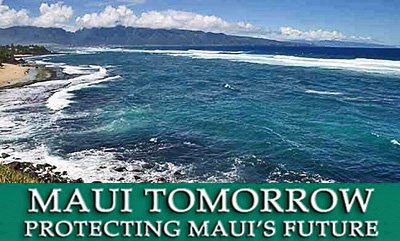The Maui News
June 29, 2009
By CHRIS HAMILTON, Staff Writer
WAILUKU – Maui County may become the second county in the state to ban the genetic engineering of taro, the Polynesian staple that is considered sacred by many Native Hawaiians.
County Council Member Bill Medeiros, who is Native Hawaiian and holds the rural Hana residency seat, introduced his bill Thursday for discussion that prohibited "any person from testing, propagating, cultivating, raising, planting, growing, introducing or releasing genetically engineered" taro in Maui County.
About 50 people, many of them taro farmers, attended Thursday’s Maui County Council meeting of the Economic Development, Agriculture and Recreation Committee to hear discussion on the controversial proposal.
The five-member committee will reconvene at 9 a.m. today for further public testimony and perhaps a vote on whether to forward the measure to the entire County Council, said committee Chairwoman Jo Anne Johnson.
The idea of banning genetic modification of taro, which is called kalo in Hawaiian, has been circulated around Maui County and the Legislature for the past couple years and has been the subject of mass demonstrations.
Walter Ritte Jr. of Molokai testified that scientists should not be allowed to alter the traditional food and cultural touchstone, especially when they have no way of knowing the long-term ramifications of their actions.
"What is happening here today with this bill is the right thing," said taro farmer Uilani Kapu.
Meanwhile, those who support genetically modified organisms, or GMOs as they’re often called, say the more than decade-old science can produce crops with higher yields that grow faster and in challenging conditions.
Genetic modification also has a perfect health and safety record as well as providing protection against disease, global warming and insects, said Harold Keyser, University of Hawaii College of Tropical Agriculture and Human Resources county administrator. UH has now taken an official stance against any taro genetic modification ban.
However, opponents of crop genetic modification, which has been dubbed "Frankenfoods" by pressure groups, vigorously and often vehemently dispute any positive claims about genetic modification. The long-term byproducts of genetic engineering, including potential health risks, remain unknown, they said, and point to Europe’s ban against the practice.
Taro farmer Victor Pellegrino submitted written testimony that stated that the American Academy of Environmental Medicine released a position against genetically modified foods in May. In the paper, the association said such foods "pose a serious health risk" and called for a moratorium on genetically modified foods. The risks included effects on allergies, immune function and reproductive health, according to study excerpts provided by Pellegrino.
Medeiros was joined by Council Members Wayne Nishiki, Johnson and Sol Kaho’ohalahala in questioning UH’s Keyser as well as Monsanto Co. employees about genetic modification. Monsanto employs about 600 people on Maui and Molokai to produce genetically modified corn and soybean seeds, they said.
Monsanto Hawaii Vice President of Research and Business Operations Fred Perlak called Medeiros’ legislation a "special interest crusade" against choice. In addition, Perlak said Monsanto has no plans to test taro. He also said there is no discernible difference between a genetically modified organism and one that has not been modified.
However, Perlak said his main point was that a GMO taro ban could lead to similar legislation against everything from corn and cotton to soybeans.
"My concern is that we start banning something before there is a need for it," said Perlak, who added that the international agricultural giant utilizes about 4,000 acres in Maui County for its seed business. "Others in the industry would see this as an unfortunate precedent."
Medeiros responded to Perlak by simply asking if it is not prudent – and normal – to create laws that preclude a health catastrophe from ever occurring.
When asked by Nishiki about the European ban against genetic modification, Perlak said there is a whole host of political and industrial competition behind the ban.
Dr. Lorrin Pang, who works for the state Department of Health but was speaking on his own behalf, said there is no proof that GMO foods are safe or dangerous.
Keyser said UH has had a self-imposed moratorium on the genetic modification of taro since 2005, and no testing is planned. However, he said Hawaiian varieties of taro should be protected if they become the unwitting victims of disease.
"It’s not a cultural issue," Keyser said. "It would be a disservice if we do not reserve the ability to use the best science available to protect taro."
This spring, Medeiros introduced the taro genetic engineering ban. His bill has been met with opposition by the Maui Farm Bureau as well.
The bill’s opponents also said a GMO prohibition could stunt Hawaii’s lucrative bioagricultural industry from taking further hold in the state.
So far, only the Hawaii County Council has voted to ban genetically modified taro and coffee on the Big Island. The measure passed in November, and Hawaii County leaders have called on Maui County elected officials to join them.
A bill by state House Speaker Calvin Say that would have taken away county authority statewide to enact such genetic modification bans failed to gain enough support during the most recent legislative session. Under persistent questioning by Kaho’ohalahala, Perlak said he lobbied in favor of the challenge to county self-rule.
Then in March, the "Taro Security Bill," which was co-authored by Maui County’s state Sen. J. Kalani English and Rep. Mele Carroll, passed both houses of the Legislature by wide margins. Both Carroll and English are Native Hawaiian and believe in the sanctity of taro.
However, the four-year ban on genetic engineering of Hawaiian varieties of taro stalled when House of Representatives’ leadership either failed to or decided against assigning conference committee members to hammer out the differences in the bills. That’s the final stage in the legislative process before the bill would have gone to Gov. Linda Lingle for her signature.
Carroll has said she intends to reintroduce the measure next year.
Maui County spokeswoman Mahina Martin said the administration has no position on the ban, but would much rather see the state take the lead in this issue. Martin said that the county has no agricultural specialists who are qualified to enforce a genetic modification ban.
But the state Department of Agriculture probably does, Martin said.
Councilors want more data on GMO taro ban
The Maui News
June 30, 2009
By CLAUDINE SAN NICOLAS, Staff Writer
WAILUKU – A Maui County Council panel put off a decision Monday on a bill to prohibit genetically engineered taro.
Council Member Jo Anne Johnson, the chairwoman of the Economic Development, Agriculture and Recreation Committee, followed the lead of her colleagues who wanted more information before moving the measure to the full County Council for consideration and deferred the legislative proposal.
Council Member Mike Molina asked Johnson and her committee staff to seek written input from the Maui County Office of Prosecuting Attorney on enforcement and the experiences of government officials from the Big Island, where a similar ban has been put in place.
Council Member Bill Medeiros, who is not a member of the committee, amended his bill to make it unlawful for any person to test, propagate, cultivate, raise, plant, grow, introduce, transport or release genetically engineered or recombinant DNA kalo, or taro.
Medeiros explained Monday that he added the word "transport" to the measure because of evidence showing that contamination or genetic modification of taro can occur during the transport of the plant.
"It’s referred to as biological pollution," Medeiros said.
Monday’s hearing in the Council Chambers was a continuation of a committee meeting first convened last Thursday. About 50 people, many of them taro farmers, attended and testified about the importance of taro in the Native Hawaiian culture and their support of protecting and preserving it in a natural and traditional setting.
"We would not be taking care of our kuleana, our responsibility, to protect the taro, the kalo," Medeiros said, if what he called a preventive measure was not approved.
Medeiros proposed on Monday that council members discuss the enforcement of the new bill later and work with Maui County officials to resolve such details.
Department of Environmental Management Director Cheryl Okuma said her office doesn’t have the expertise, training or facilities to enforce the law. "We can’t do it," Okuma said.
Responding to committee members’ questions, Okuma said she could not even suggest who might be most appropriate to assume such responsibility. Council Members Sol Kaho’ohalahala and Wayne Nishiki, who were not committee members but attended Monday’s hearing, separately suggested to Okuma that her office develop such expertise.
"We would hope you would take a proactive position," Kaho’ohalahala said.
Mayor Charmaine Tavares has not taken a position on Medeiros’ proposal, nor has she taken a firm position about the genetic modification of taro, according to county spokeswoman Mahina Martin. "She’s listening carefully on how it plays out," Martin said.
Medeiros also added into his measure Monday a provision that would give the director of environmental management the authority to adopt administrative rules to implement the proposed law.
"I think we need to be brave. This is not something popular to do. This is something right to do," Medeiros said.
Okuma said she couldn’t even comment on the costs of enforcement or the number of staff needed to oversee the ban or investigate any violations of the ban.
"This is way outside our expertise," she said, adding that the County Charter specifically assigned her office with jurisdiction over wastewater and solid waste.
Maui District Health Officer Dr. Lorrin Pang attended the meeting as a private citizen. The committee called on him for expert advice, and he said he had done similar genetic modification testing in an experiment with disabled high school students and was able to ascertain results within an hour of obtaining samples and at a relatively low price of $6 a test. There are other tests that could run as high as $200 to $300 per sample.



